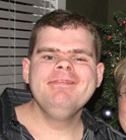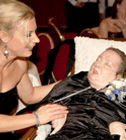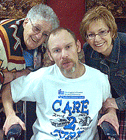Faces of HD
Meet Emily

Emily was a happy energetic young girl who enjoyed reading a good book over and over, did well in school, liked salsa dancing, hip hop, soccer, basketball, fishing, camping, movies with popcorn and getting dressed up. With a smile that would light up the room and a personality to match, she chose her friends not by how they looked or what they had but for the kind of person they were. Emily had definite opinions and didn’t mind sharing them. As high school graduation approached and her hopes and dreams came closer to becoming a reality she was told that she had Juvenile Huntington’s Disease for which there was no cure or treatment and her time was short. Her dreams and everything that she had hoped to experience were gone. No trips in her car, no marriage, no babies, no home of her own and no time to grow old. In addition to this, everything that she had come to enjoy would be taken away. No more soccer, basketball or running. No casting a line or reeling in a fish. No driving her car. No eating popcorn, Doritos or anything hard and finally nothing at all. She was called clumsy, drunk and retarded by people she had done nothing to. Emily’s formal education ended in college when an instructor humiliated her in front of her classmates by asking if she was retarded and threatened her with failure unless she quit. Emmy left the class but she refused to give us the instructor’s name because she didn’t want them to get in trouble.
She fought Huntington’s Disease in the only way she could. She opened her heart and shared her story with Students, Professors, Doctors, Researchers, Politicians, Family, Friends, Strangers and all who would listen. She talked to them all and then she would come home, ask if we were ok and Wish for A Cure. Even though she knew it wouldn’t help her, Emmy continued to participate in research and talks until October 5, 2009 when she lost her battle.
Huntington’s is an autosomal dominant, neuro-degenerative disease that robs a person of the ability to walk, talk, think, swallow, and control movement. HD symptoms are the same as the worst of those associated with other neurological diseases like Alzheimer’s, Parkinson’s and ALS and a cure for one is likely to benefit all. Unlike others, Huntington’s disease has a known genetic location and can be positively identified and studied in people long before they become symptomatic. This gives researchers a leg up and makes Huntington’s Disease an excellent candidate for research.
Emily is our daughter. She taught us more about how to live and treat others than we could ever have hoped to teach her and she is the reason that we’re asking you for the sake of others, Please Help.
















































